Facebook for Real Estate: The Ultimate Guide for REALTORS®
How to Grow and Generate Real Estate Leads on Facebook
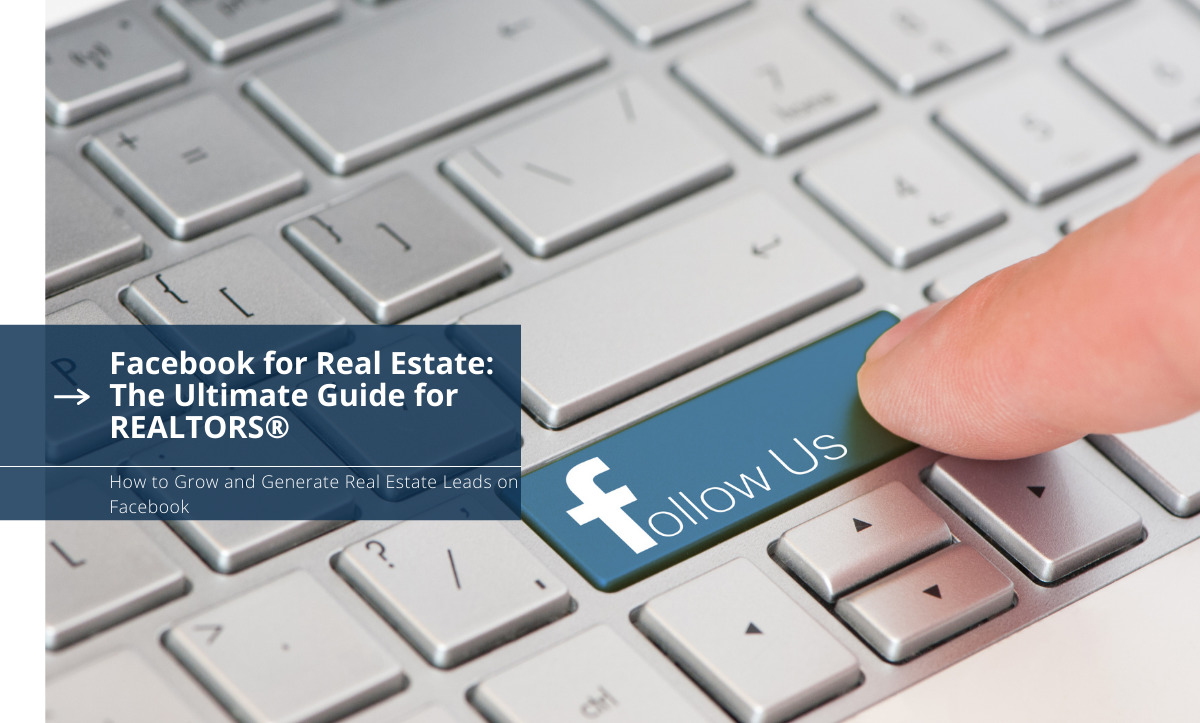
Say you are going to promote your business on social media. Which platform would you go for first? Common sense says the most popular one. What’s the most popular one currently? Facebook. Clear as a day. You need to use Facebook for Real Estate. If you’re not promoting your business on Facebook yet, you should be. Maybe that’s why you’re reading this. Or maybe you are on the platform but are not getting the results you want. Either way, we have your back. Keep on reading.
Why Do Real Estate Agents Need Facebook?
For marketing Real Estate relying solely on traditional methods like print ads is not effective anymore. After all, who reads the paper these days? Comparatively, the average American spends 2 hours and 22 minutes on social media every day. 38 minutes of that time is spent on Facebook.
Social media is used to promote content REALTORS® produce and to generate leads. There are a lot of people who would do business with you. The problem is they don’t know you. And the other sad fact is many REALTORS® aren’t using Facebook effectively. They may randomly post images and videos and hope for the best. But that won’t work.
You use Facebook for Real Estate marketing so your audience will know you. How? By sharing valuable content that will introduce you as someone who is an expert in the field. As simple as that. Other technical facts support the idea of why you should use Facebook for Real Estate marketing. Here are some:
- Facebook has 2 billion active users daily and 3.03 billion monthly users.
- 63% of Realtors use social media to promote listings, and
- 59% of Realtors agree that social media is “very” or “somewhat” important.
- The average person spends 35 minutes a day on Facebook.
There is no question that social media has become an important part of our lives. Especially in these hard times when the COVID-19 pandemic has forced humans to have less social contact and encouraged cyberspace connections. Keep reading and we will tell you how to use Facebook for Real Estate and expand your business.
Establish Your Real Estate Business’s Presence on Facebook
1. Create a business page
You need a BUSINESS page to use Facebook for Real Estate. You do not want to use your personal page to do business. Your friends on Facebook won’t be happy with the business content you post. In the best-case scenario, they will ignore you. Furthermore, you will be missing out on business features the platform offers including promotional tools and marketing insights. So without further ado let’s get into it. Let’s see how you can create a Real Estate page on Facebook.
Assuming you have a Facebook account, log into your personal account on Facebook, and click on CREATE in the top right corner. From the drop-down menu select PAGE.

2. Page Set-Up
- On the left section under PAGE NAME put in the name of your company or your own name. Do not overdo this section by using too many words.
- In the next field, CATEGORY, type in Real Estate and then choose REAL ESTATE AGENT from the suggested option.
- In the DESCRIPTION section describe your business like your expertise, credentials, the neighborhoods you cover, where you are located, etc Remember when people first visit your website they need to know about you to browse your page further. Make the description section informative and cheerful.

4. Set Your Profile Picture
- Scroll down to set your PROFILE picture. You need to have a professionally taken headshot that is used on all your social accounts consistently. Using different photos for different platforms is a bad idea as you will not have a single image to present your brand. Also, cropping a family vacation image to get a headshot is a bad idea as it will make you look unprofessional. If you are presenting your company go with the company logo.

- For your COVER photo, you need to use an aesthetically pleasing photo that describes your business and presents positive associations. Cover images should be 851 × 315 pixels. It is worth investing in professional photography and editing for the images you use on your profile.
You may also use a video for your cover page. Use one that describes your business. Videos will play muted by default and most visitors will not tap for sound so make sure your video makes sense without sound. Videos must be between 20 – 90 seconds and at least 820 × 312 pixels. The recommended size is 820 × 462 pixels.

5. Preview and Create
- In desktop and mobile modes, you can preview your page on the right. Make necessary changes and click CREATE Page once you are done.

6. Add Information
After creating your page head to PAGE SETTINGS and then PAGE INFO. Complete the fields to make your profile more informative and descriptive to the visitors.
In the username field, you can assign a unique ID to yourself that will act as your custom URL too. Make it distinctive and special to yourself and your business.

Go on and fill in the contact information and location data and other details like working hours. They are pretty simple and you will figure them out.

Read More: How to Use Facebook Live for Real Estate: A Step by Step Guide for REALTORS®
Share Interesting and Engaging Content on Facebook
Facebook offers many ways to share content and developers are constantly creating new ways too. Think of Facebook’s stories which were non-existent not long ago. Getting to know each platform’s features and making the best out of them is essential to success. The following are recommendations for what to post on Facebook for Real Estate agents:
1. Listings
This is fairly obvious. It is the core of every REALTOR®’s activities. Promoting listings is a must in all of your social media accounts. Given Facebook’s wide use, you will benefit greatly from sharing listings here. Your website may struggle in terms of getting enough traffic but Facebook can accelerate the process for you. The true value of social media is its feature of sharing. People can easily share your content with their friends and increase your reach.
Do keep in mind that what you do on Facebook is mainly promoting valuable content. This means you shouldn’t take it as a place to sell directly. Sharing listings is okay as long as your main content is aimed at helping your audience through informative, educational, and useful content.
Remember people won’t share everything. What do you usually share with others? Probably something you find interesting. Something that offers some sort of value. Try to create the same amount of value in your posts. That is the core of content marketing: Valuable content that makes people share it.
You don’t want your page to look like MLS. Go with the 80/20 rule. For every 8 educational and informational content you get to share 2 listings posts.
2. Neighborhood Guides and Images
People may like the property but first, they choose the neighborhood. In fact, the neighborhood is just as important as the property itself. Providing info on the neighborhoods you cover introduces you as a neighborhood expert. This increases your validity as a REALTOR® and attracts more clients. Show them you know the neighborhood like the back of your hand.
Roomvu offers branded neighborhood videos for REALTORS® that feature high-quality and data-packed footage of different neighborhoods. These can be incorporated into your Agent Profile and are easily shareable. Click here for more info.
3. Videos
Videos in Real Estate are an important asset. They are getting close to replacing the actual visiting of the properties. On Facebook, they get close to eight billion views daily. There is no question people prefer videos to text. Below we outline why you want to use video on Facebook for Real Estate success.
Video Benefits
- They are visual and people love visuals
- You can show a property at the same time to many people
- You don’t need to spend time when people are watching home walkthrough videos
- They are great at generating leads
Types of Videos
- Listing videos
- Home walkthroughs
- Market updates
- Home buying/home selling / renting tips and tricks
- Drone videos
- Testimonials
- FAQs
- Neighborhood videos
4. Customer Success Stories
One of the best ways to convince visitors to your page that you are the agent for them is to give them a positive impression of how you do business. A good way to do this is to show how your previous clients felt about doing business with you.
Sharing your previous clients’ stories allows visitors to imagine what lies ahead should they work with you. You can go on and on about what a great agent you are but that is just another claim to be proven. Your recent client’s story is solid proof that you are what you claim to be.
Post different posts of your recent clients featuring a photo of them in their new house or even better sit with them and do a video testimonial. Ask them to describe their home-buying journey, where they started, what they went through, how you helped them, and how they feel now. Let them do the talking.
5. Share Blog Posts
A lot of REALTORS® who use Facebook for Real Estate do so to increase their brand awareness. While you can have an active online presence by engaging with your audience and sharing others’ related content on your page, the ultimate goal is something else.
In content marketing, your website/blog is central to everything you do. Given the fast-changing nature of social media trends, your best bet is to invest in your own website. And what about social media? It should be used as an avenue to promote content given its broader reach. You should post your content on your website and then promote them on social media. The ultimate point here is:
Every piece of content you share (original content) should link back to your website.
It is a good idea to tailor your content to fit the standards of different social media and share them there. This way you can link them to your own website to generate leads. Facebook too can be used for this purpose. You can set up your blog to automatically share your content on Facebook. This way you will showcase your expertise and qualification as a top-notch REALTOR®.
6. Infographics
As the name suggests Infographics are images (graphics) packed with info. They present information like stats and data visually to facilitate learning. A lot of topics like market updates can be presented in infographics. They offer great value if presented in a visually appealing way.
It is a good idea to invest in designing your infographics professionally. After all, you want to look professional as that is who your leads are looking for. Use up-to-date information and data that offers value and rest assured your audience will like them and share them.
7. Tips and Tricks
You need to build trust with your audience. So how do you win your audience over? By showing them you are here to help. This suggests that you value them, and their time, and are empathetic to their concerns and needs. By sharing content like tips and tricks for first-time homebuyers you spark thoughts of buying or selling homes. Ensure you have a constructive and helpful mentality while creating and sharing content. You offer help and people reward you with their business. As simple as that.
8. Renovation and Home Design Tips
Your job on social media is not to sell. It is to help. Related content to what you do can be used to reach this goal. Your business is about properties. You can share ideas for home designs or renovation to encourage both homebuyers and homeowners to think of making their homes better. Sharing content like how to renovate your home before selling it is what you need to encourage people to consider doing business with you.
9. Images of Houses Which Have Sold Recently
This is similar to customer success stories in a sense but it does focus on your achievements. If you claim to be a rock star but never perform people will find it unlikely. Posting images of the houses you have sold in the last few weeks proves you can do the job.
10. Behind the Scenes Look at Your Business
Another cool thing to do to get your audience’s trust is to let them know about you and your company. Share a post describing your team and tell your story. people love stories and in fact, the last and the best level of content marketing to achieve is the STORYTELLER. Let them know you in person. Your team. How you work and what you care for. Your values and your standards. This builds a relationship.
11. Home Buying Process Description
A lot of people have never bought a house. It is their first time and the journey ahead is a labyrinth full of questions. You as a REALTOR® can show them the way and shed some light on what is to be expected. Go through different steps first-time homebuyers need to go through and describe the process in general.
People have a tendency to avoid topics they know little about. Once those ambiguities are gone they are more inclined to try something new. If they are not considering buying a new house because they don’t know what to expect, show them the way. Acting as a guide is a constructive way to use Facebook for Real Estate.
12. Market Update Reports
Prices go up and down from time to time. Either way, you have a chance to encourage someone to do business with you. When prices go down there are more homebuyers and when they soar home sellers get moving. Make sure you remind your audience of such changes in prices to increase the likelihood they think of buying or selling.
roomvu makes customizable Real Estate videos with your branding and you can share them with a click of a button. Sign up for an account today and start converting your audience to leads.
13. Featured and Customized Tabs
A Facebook business page has a set of standard tabs by default. However, the platform allows you to design your own customized tabs. Besides standard tabs like “About,” “Events,” or “Photos,” you can add custom Page tabs via the Facebook platform. We recommend that you create a tab for featured properties. The ones that are strategically more important for you. Your best listings. This way, you will increase their reach as they will sit on top of your page all the time. You need to share some posts every once in a while and remind your audience about this tab, though.
Note: Only Pages with 2000 or more likes can create custom Page tabs.

14. Newsletter and Sign up Page
Your newsletter is a tool you use to get people’s contact information. Share a post with a link to your landing page for your newsletters and describe what people will get if they opt-in. This way, you can expand your lead generation and get more leads to nurture further by emailing them more content.
How to Connect with Potential Clients on Facebook
Facebook is so big, and new features are added all the time. In this section, we have collected some tips you can apply to your page to increase generating Real Estate leads on Facebook.
1. Always Think about Quality and Focus on Client Needs
You can share lots of content on Facebook for Real Estate and get nothing in return. This is what many REALTORS® are doing on the platform. Your ultimate goal is to sell, but Facebook is not the place for making a hard sell. You need to produce quality content, slowly build an audience base, gain their trust, introduce yourself as an expert, and wait for them to need you.
Many other agents are already churning out content going nowhere as it does not aim at helping people. You do not want to do the same. The content you produce should target the needs of your audience. What do they need exactly?
2. Use More Video in Posts
Videos are easy to watch, and text takes more effort. This suggests you need to have more videos. Sharing others’ videos might not be a bad idea, but posting original videos created by you, featuring you helping your audience goes a long way. Also, listing videos generate 400% more interest than images, a study says.
However, remember that although you do not need to practice Hollywood standards in making your videos, grabbing your phone and recording a shaky, blurry video with a bad voice-over is not going to impress anyone. Ask for professional help if you don’t have the time or the resources to make quality videos here.
3. Stay Consistent
Just like any other platform for sharing content including your own website, you need to make a habit to post content regularly to keep your audience tuned. People will unfollow you once you have gone quiet for a while or have an irregular pattern in sharing media. Share content once a day, once every other day or more, whatever, but just keep it that way, your audience will be expecting your content.
4. Find Out the Best Time to Post
Not every hour of the day is the best time to post content. Your audience’s news feed is flooded with all the content from the pages they have subscribed to. If you post content when they are not active online your content will be buried.
Find the time your audience is most active.
The long way is to try posting on different days and hours over the course of a few weeks and then use Facebook insights to see what days and times of the day have the best results.
The short way is to see what studies and research say. According to LUXVT the best time to post on Facebook is between 1 p.m. to 3. pm on Thursdays and Fridays. Check it out and see if it helps.
5. Use the Facebook Search Bar
Here is a cool trick from easyagentpro that allows you to find leads on Facebook for Real Estate. Further to simple inquiries like for groups and people, the search bar can also be used to search for keywords. Simply put, you need to search for:
- Buying a home
- Buying a house
- Home Hunting
Other keywords like open house are shared with other agents’ posts so it is recommended to stick with the phrases mentioned above.
On search options set the location to your target city and hit enter. On the results page click on the posts options to show only the posts people have shared.

Once you find some leads this way, don’t try to make a sale. Introduce yourself and offer some tips. First, prove yourself. Nobody trusts someone who has just shown up. Show who you are. Explain how you can help them, and if they ask for help, be there for them. Trying to make a sale right off the bat will probably not end well.
6. Make it Easy for Your Audience to Contact You
Real Estate is about connections between prospects and you. When your audience is convinced you are worth doing business with, they will need your contact info. You may have posted your contact info in your bio and about section but that is not enough. You need to strike while the iron is hot. Put your contact info on your posts, descriptions, and wherever you see fit. Don’t spam though.
7. Embrace Search Engine Optimization (SEO)
SEO is not just used for websites. Wherever there is a search engine with a search bar, there are keywords that can be used. Optimizing for these keywords is a sure way of making your content found when people search for those keywords.
If you are new to Facebook for Real Estate and don’t have enough followers and contacts on the platform, incorporating SEO into your page will drive more traffic to your page and increase its discovery rate. However, make sure you use relevant keywords for your page that align with what you do. Spamming irrelevant keywords may bring people to your page but will disappoint them and not be good for your reputation.
8. Comment and Reply to Comments
The comments on social media are a direct way your audience and clients can contact you, ask questions, express their problems, etc. show to them and other people on your page that you care for your customers and audience by replying to those comments quickly. Have a problem-solving and helpful mentality while responding to comments and if someone leaves a negative comment handle their complaint professionally and offer help.
It is also a good idea to expand your online presence by actively liking and commenting on other people’s relevant pages. This will get your name out there and increase your brand awareness. Interaction and communication are an essential part of Real Estate in general and using Facebook for Real Estate.
9. Use Page Insights
A key step in content marketing is measuring the effectiveness of your efforts. Finding out how your page is doing will give you an idea of the things you need to take to improve. Facebook insights provide information about your Page’s performance, like demographic data about your audience and how people respond to your posts. You can use Facebook insights to:
- Understand how people are engaging with your Page.
- View metrics about your Page’s performance.
- Learn which posts have the most engagement and see when your audience is on Facebook.
To see the insight of your page, go to your page and select insights from the left menu.
10. Use Surveys, Polls, and Questionnaires to ask Your audience preferences
Finding what your audience needs is a key step in your marketing efforts. After all, not all people have the exact needs, concerns, and problems. Doing audience research is mandatory to tailor the content you produce to fit the readers and visitors of your page. You can achieve this critical goal by asking your current audience about what kind of content they would rather see on your page and how you can help with their problems. This goes well with the problem-solving mentality you should have.
Also, with every poll and survey you do, first, explain why you are doing this. Let your audience know this is to provide them with better content and not just for you. This way you will increase the chances of participation. You know people always ask this question before doing something and spending time on it: “What’s in it for me?” Let them know what.
11. Ask Your Audience for “referral friends”
An easy way to generate some easy leads is to ask your audience on Facebook to connect you to their friends who have mentioned intentions of buying or selling property. But be careful how you do this. Do not share a post asking people to do so. A single private message is the best option. However, if you have not been in touch for a while with the person you are sending the message to, first of all, introduce yourself and explain who you are. Going wide and complex on this will show you desperate and unprofessional. Worthwhile use of Facebook for Real Estate requires tact and discipline.
12. Offer Gated Content
Apart from the free content, you share on Facebook for Real Estate you can offer some gated content as well. This type of content is what the visitors need to pay, not with money but with their contact info.
Create a lead-capturing landing page on your website and link your Facebook post to it. This way you will offer higher-value content or services for contact information. Your audience will happily submit such info provided that your landing page is convincing enough.
The content or services you can offer in your landing pages include:
- Buying a home tips
- Selling a home tips
- Home valuation
- An insider’s guide to living in your town
- Neighborhood reports (i.e., schools, crime, traffic, etc.)
Facebook Ads
In this section, we will explore Facebook ads for real estate and go through the tips to maximize their effect and use your budget correctly.
1. Set Defined and Clear Goals
What do you want to achieve by using ads? Making money is not the answer. Are you trying to:
- Fill your sales funnel by generating leads.
- Branding and awareness?
- Getting more followers?
- Increase website traffic?
- or something else….

Based on the strategy you have developed for your business (hopefully you have one) you need to have a single, clear, and specific goal (that’s why you are running the ads, right?) without a goal you are lost in the middle of the ocean, desperately paddling for the shore but being tossed around by waves.
2. Budget
Facebook ads are not a one-time investment. Agents need to spend money consistently over time to see results. Every market is different but according to Curaytor agents need to pay around $500 to $1000 monthly to expect 60 to 80 leads provided they have done their homework in creating the right ad. Spending money without a plan and solid strategy will not produce the desired results. But you do not necessarily need to start big. $300 a month will do until you have learned the ropes.
3. Ad Schedule
You might think that the longer your ad is out there the better your chances will be of generating leads. But with Facebook, shorter ads ( running for around 5 to 7 days) produce the best results. Two weeks is the maximum number of days you should go for. However, experiment with your ads and let the data tell you what’s best for you.
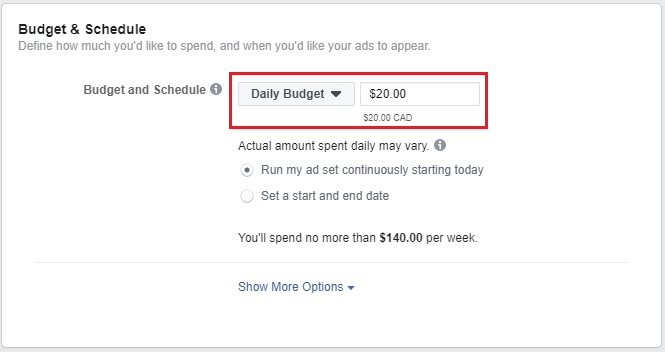
4. Ad Placement
You can choose where to show your ad:
Devices:
- Desktop timeline
- Mobile timeline
Placements:
- Audience Network (Facebook’s ad network)
- Messenger
Depending on your objective, audience, and what stage of the marketing funnel you are focusing on, you should decide on where your ads could be shown. Using Automatic Placements will use up your budget to get the best results. This is recommended if it’s your first time creating ads on Facebook or your goal is raising brand awareness. But if you are pretty comfortable creating ads or want to target your audience with specific goals (conversions), it’s best to choose the Manual Placements and select the placement you prefer your ads show up.
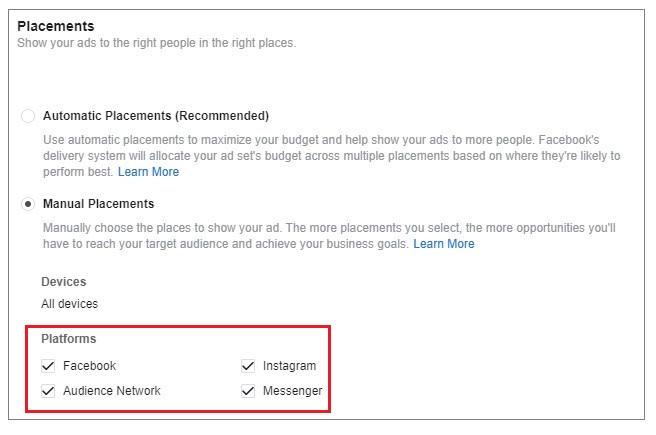
5. Know Your Audience
In marketing for small businesses, you wouldn’t mass target everyone. You are not Coca-Cola. To make a profit you need to target a small share of the market. The one that’s closest to you and whose needs are the ones you are able to solve. As suggested by Curaytor marketers must target monthly audiences in the 40,000 to 60,000 range. This is the average number that can be narrowed down further depending on the goals and business strategy. To choose the right audience consider the following:
- Your past happy clients
- Areas and types of homes you are good with
- Homes you enjoy helping others buy or sell
- Your strong points in Real Estate
6. Narrow Your Audience Down
As mentioned above you need to target a very specific group of people who need your expertise can speak to. Narrowing the audience by geography and age is usually enough in most cases, but you can always include more criteria to make your niche more specific.
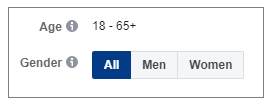
7. Think Local
It wouldn’t be wise to choose your target ads from people in other cities unless many people are migrating from other cities to the city you cover. Ads do best when agents divide the target audiences by area and region, whether that be neighborhoods in a city or areas of the country.

Use Facebook’s geo-targeting tool to target the city you cover or target a zip code. Even if you cover multiple cities, you should run ads one by one for different places. If you choose the whole country, Facebook will do the job and display the ad where it thinks will be most fruitful and will leave some areas.
If you want to target people from other cities who are moving to your city, you can use the location drop-down menu.
8. Behavioral Targeting
Luckily Facebook offers a wide range of criteria for targeting the audience of your ads. For instance, In the detailed targeting section under Demographics>Life Events, select newlyweds, which will pick one type of user you can focus on. The ones who might need your real estate services.
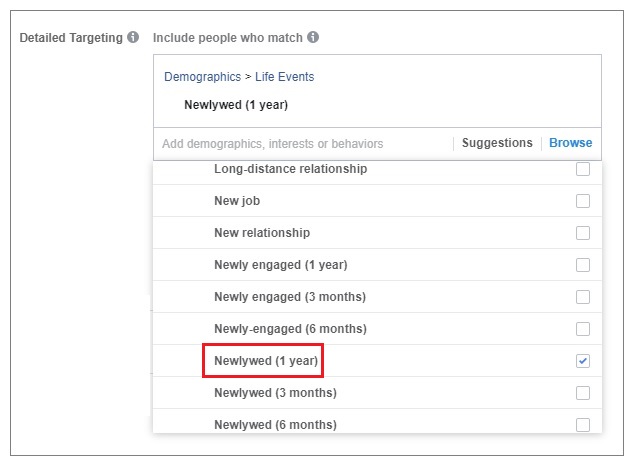
9. Make the Perfect Ad
In order to get people to click on your ad, you need to give them a good reason. People care about themselves the most. Your ads should target the same problems in a group of people with the exact needs and characteristics (that’s why you need to narrow down your target) then people will click on your ad for their own sake, not yours. This is fundamental to good marketing.
You need to make the ad fit the audience in terms of the language media, and price range, you wouldn’t use the same tone for first-home buyers and seasoned veterans of owning homes.
10. Incorporate Positive Associations
Making your audience feel special goes a long way. In order to encourage people to take a step towards buying or selling a property, you need to make the offer sound promising and as though the audience deserves it. This method has been in use for a long time in TV and radio ads where the product being advertised is always a symbol of joy, elegance, happiness, and relief. Try to create the same feelings in your ads. Show your audience they deserve it, and you are on their side.
11. Go Pro on Graphics and Design
Traditional advertising has utilized eye-catching tones and designs either in print or in videos. You have a very small window of opportunity to catch someone’s attention as they are scrolling down their news feed or surfing on different pages. If your ad doesn’t look good, you have lost your chance regardless of the ad’s importance for your audience.
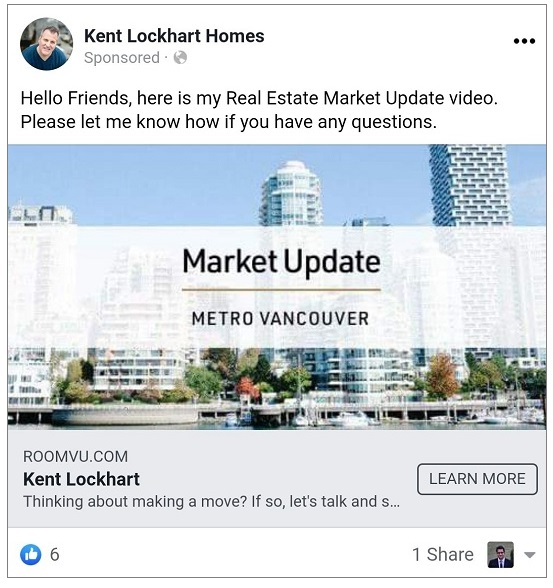
Also if you want to stand out in the competition, you want your ad to be different and stand out. Use your imagination and create something original. Use astonishing and eye-catching graphics and photos.
12. Go Easy on the Words
Once the passerby has stopped and looked at your ad, it should be an easy read. Your ad is definitely not the place to show off the lexical diversity and grammatical complexity. Go easy with words and focus on conveying the message, in the most straightforward way it can be. Include these points:
- Who are you
- Who you are trying to help
- What you are offering
- What they will get out of it
13. Call to Action
When you run an ad, you have a target audience and a message with a defined outcome. Now it should also have a single, clear call to action. What do you want the audience to do? Just like your landing pages. Tell them what to do. People won’t bother to figure it out themselves, and if they find it challenging, they will pass on the offer. Don’t give in to the last step.
14. Link to a Landing Page
It is a good idea to direct the people who have clicked on your ad to an exclusive landing page. A landing page is a special page that serves a single purpose which in this case can be a:
- Home Evaluation
- Tips and tricks, guides
- Customized listings
- Arranging a meeting or a phone call
Make the landing page aligned with the ad. Make it simple and add value by using a video in it. Avoid clutter and target a single goal.
15. Think of The Next Steps
You have successfully run your ads and gotten people to click on your CTA, now what? You need to have a plan for nurturing these leads to facilitate the process you need to take advantage of a customer relationship management (CRM) program to handle the contacts you have generated just to be followed by effective drip-email marketing. Such measures will increase your conversion rates over the course of time.
16. Practice Practice Practice
You can sit and think of the best ad or you can look at what others are doing. It is easy to find who is doing good with ads and what ads are getting the best results. However, when looking for the best practices, don’t compare yourself to the big players in the market. What a well-known company is doing won’t work for you as their strategic needs differ from yours. Instead have a look at your peers, the agents at your level. The ones who are doing great with their ads. Do not reinvent the wheel. And obviously don’t copy. This is about impressions.
Visit your competitors’ Facebook pages and websites. Look for their ads. See how they are doing. Notice the constructive details in their ads and spot the problems so you won’t make the same mistakes. See what works and what doesn’t work.
17. Focus on One Listing at a Time and Use Carousel Format
If you are promoting listings in ads, focus on one listing at a time and avoid cramping images of multiple homes into one ad. Instead, try to share images of a single property including different angles and places. This way you have a better chance of generating a lead compared to confusing the audience with an array of vaguely mixed images.
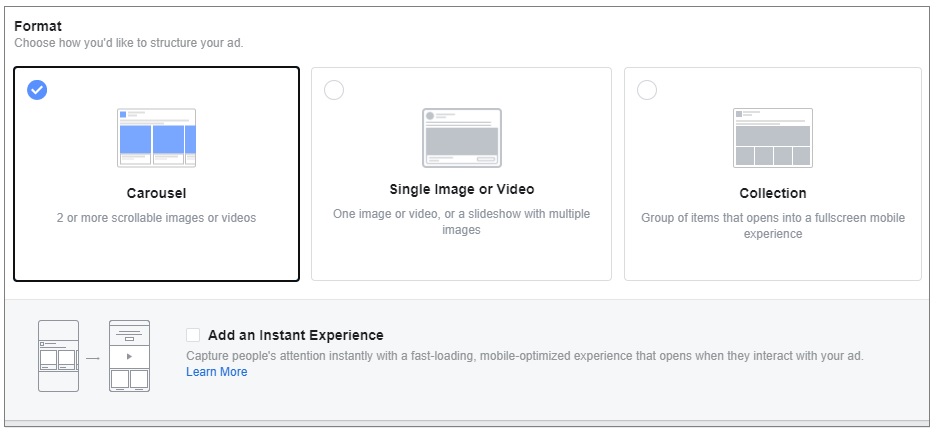
Also, try to induce a sense of curiosity in the audience by holding back some details, the exact location, or the listed price. This will get the audience wondering where the property could be or how much it is worth. Such thoughts drive inquiry. And inquiry will lead to following the CTA included in the ad.
18. Target Newlyweds or Recently Engaged People
A study by Coldwell Banker suggests that 35% of newlyweds buy their first home before their 2nd anniversary. This makes sense, given the commitment just made. Fortunately, Facebook allows users to mention such important life events, and this info can be used in your ads by selecting newlyweds in the demographics section.
roomvu Facebook Automation Calendar
We know that agents have difficulty managing their own routine tasks associated with their job, and their plate is already full. That leaves no room for new tasks like managing social media, which tend to require a lot of time. That’s why we have created social media automation software.
This automation software not only shares the content on social media but also creates the content agents need based on their sales activity and prospects. All they need to do is to connect to their Facebook account.
Join now and start your social media presence today. Wait no longer as every day passes, you miss your chances of getting leads on social media!
Read More: Top 10 Real Estate Facebook Pages to Follow in 2020
The Takeaway
Facebook is the king of social media, and social media plays a vital role in business thanks to technological advances. Opting out of social media will deprive agents of many firms and leads. However, the platform is changing every day and offers a lot of features unknown to most REALTORS®. Taking the best out of what Facebook offers for real estate will have a significant impact on you as a REALTOR®.
Make sure you have set up a business page on Facebook for real estate and optimize it. We in Roomvu also offer help in terms of creating videos and other media to be used on Facebook and other platforms at an affordable price. Check out this link for more information.


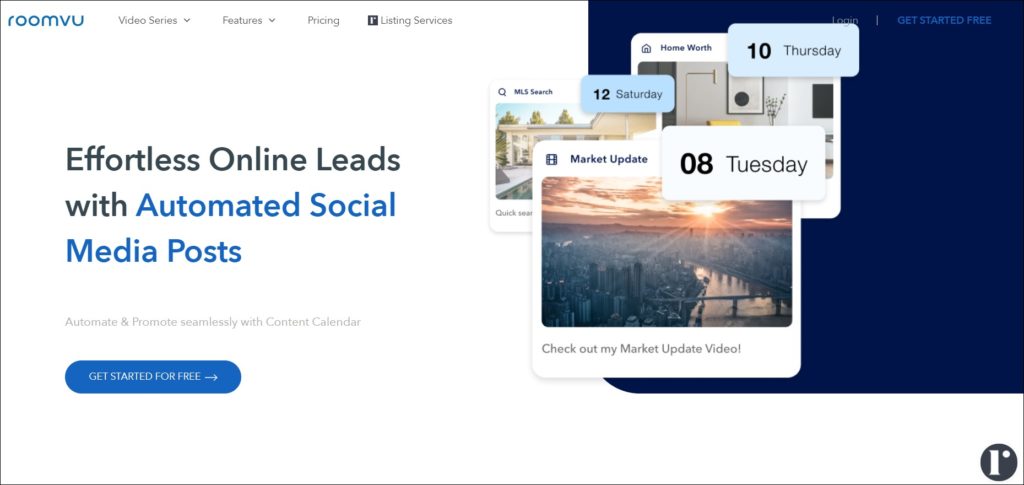

10 Comments